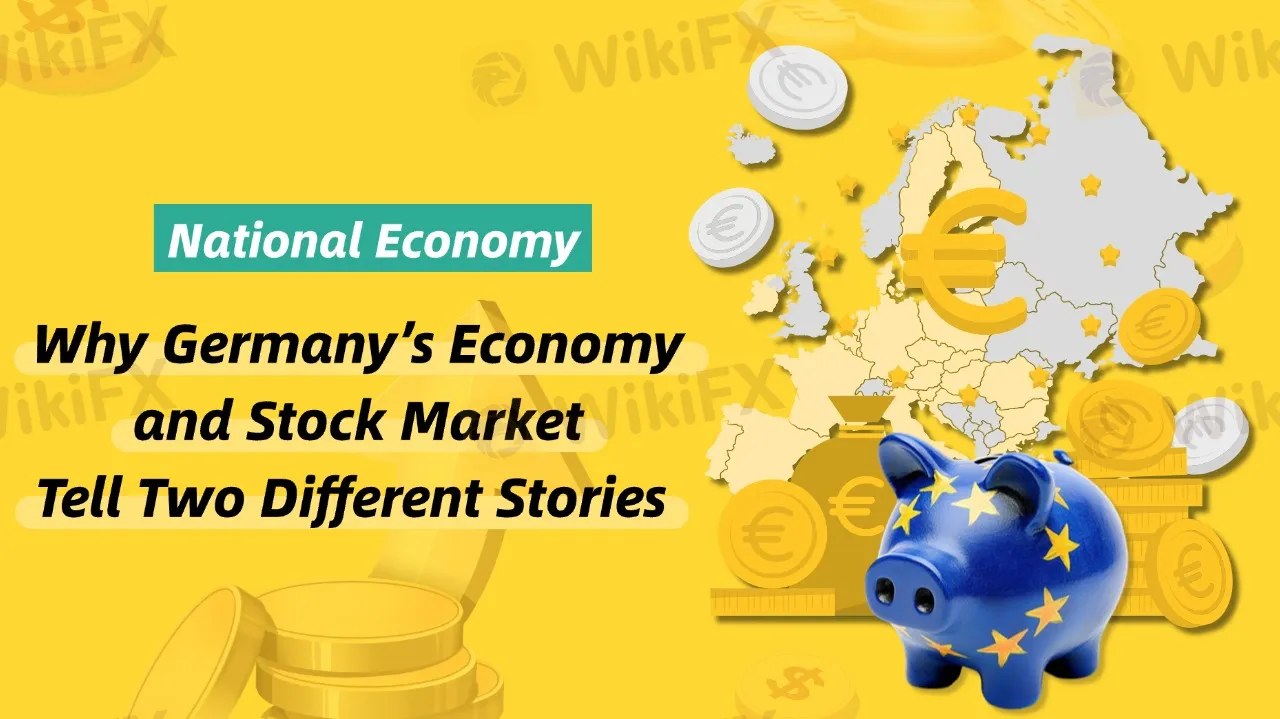简体中文
繁體中文
English
Pусский
日本語
ภาษาไทย
Tiếng Việt
Bahasa Indonesia
Español
हिन्दी
Filippiiniläinen
Français
Deutsch
Português
Türkçe
한국어
العربية
Why Germany’s Economy and Stock Market Tell Two Different Stories
Abstract:Germany's economic growth has continued to be sluggish, yet its stock market has remained exceptionally strong, sparking widespread attention. Why do we see a coexistence of economic stagnation and stock market prosperity? In this article, we will delve into the reasons behind this phenomenon and possible strategies for addressing it.

The performance of Germanys stock market, especially the DAX index, has been impressive in recent years, rising by 50% since 2023. The DAX index represents the 30 largest listed companies in Germany. Despite the weak economic growth across Europe, the “Seven Giants” of the DAX—SAP, Deutsche Telekom, Allianz, Siemens Energy, Munich Re, Siemens, and Rheinmetall—have performed exceptionally well, driving the stock market's rise. In 2024, 98% of the DAX's gains came from these seven stocks, with SAP alone contributing 7.8% of the increase.

However, Germany's economic growth has continued to be weak. As Europe‘s economic engine, Germany’s economy has increasingly struggled due to insufficient domestic demand and the impacts of global economic uncertainties. While Germany holds a significant position in exports, particularly in the automotive and high-tech sectors, the lack of domestic consumption and investment has led to a weak GDP growth. In 2023, Germany's GDP growth relied heavily on lower domestic demand, which contributed to its overall economic underperformance.
Divergence Between Stock Market and Economy
The fundamental reason behind the divergence between Germany‘s economy and stock market lies in the difference between the composition of companies in the DAX index and the structure of Germany's domestic economy. Most companies in the DAX index are export-oriented, with 80% of their revenue coming from outside Germany, especially from the U.S. market. This reduces their reliance on domestic demand. In contrast, Germany’s GDP growth primarily depends on domestic demand, which explains the disparity between the two.
Moreover, the sectoral composition of the DAX index differs significantly from that of Germanys GDP. For example, industries such as public services, transportation, real estate, and construction, which contribute significantly to GDP, have a small weight in the DAX index. Over time, the sector structure of the DAX has changed, with a growing proportion of tech companies and emerging industries, while traditional sectors such as automotive and chemicals have seen their weight decrease.
How to Respond?
Faced with this divergence between economic and stock market performance, both investors and the government need to adopt cautious strategies. For investors, understanding the financial health and growth prospects of leading stocks could provide valuable insights for investment decisions.
From a government perspective, boosting domestic demand, particularly in sectors such as public services, transportation, and construction, could help strengthen the resilience of the domestic economy. Additionally, attention should be paid to global and export market trends to minimize risks associated with over-reliance on a single market.

Disclaimer:
The views in this article only represent the author's personal views, and do not constitute investment advice on this platform. This platform does not guarantee the accuracy, completeness and timeliness of the information in the article, and will not be liable for any loss caused by the use of or reliance on the information in the article.
Read more

Merin Regulation Review 2025: Is Merin a Safe and Legitimate Broker?
The online trading industry is filled with both regulated brokers and high-risk offshore platforms. Among them, Merin is a forex broker that recently attracted public attention. As more traders look into Merin, a key question arises: What is the Merin regulation status, and is Merin safe or a potential scam?

Voices of the Golden Insight Award Jury | George Georgiou, the Co-Founder of Dynamic Works
WikiFX Golden Insight Award uniting industry forces to build a safe and healthy forex ecosystem, driving industry innovation and sustainable development, launches a new feature series — “Voices of the Golden Insight Awards Jury.” Through in-depth conversations with distinguished judges, this series explores the evolving landscape of the forex industry and the shared mission to promote innovation, ethics, and sustainability.

Prop Firm Tradeify Signs ‘The Nuke’ as Global Brand Ambassador
Miami-based prop trading firm Tradeify has officially announced a major long-term partnership with Luke “The Nuke” Littler, the current World Number 1 and reigning 2024/2025 PDC Darts World Champion. Littler joins Tradeify as its new Global Brand Ambassador, marking one of the company’s most significant branding investments to date.

Close Up With WikiFX —— Take A Close Look At Amillex
With the rapid growth of global multi-asset investment markets, the differences among regional forex markets have become increasingly significant. As a forex broker information service platform operating in more than 180 countries and regions, WikiFX is dedicated to helping investors in every market identify reliable brokers. Therefore, we have launched an exclusive interview series —— "Close Up With WikiFX", offering in-depth conversations with local brokers. This series aims to dive deep into frontline markets and provide first-hand information, helping investors gain a clearer and more comprehensive understanding of quality brokers.
WikiFX Broker
Latest News
In-Depth Uniglobe Markets Commission Fees and Spreads Analysis – What Traders Should Really Know
WikiFX's New Evaluation of ATM Capital LTD: Does its License Protect the Arab Investor?
Is Axi Legit? A Data-Driven Analysis of Its Regulatory Standing and Trader Feedback
How a Fake Moomoo Ad Led to the “New Dream Voyage 5” Scam
FXPesa Review: Are Traders Facing High Slippage, Fund Losses & Withdrawal Denials?
Trive Investigation: High Score, Hidden Risk - The Profit Paradox
CMC Markets Australia Revenue Surges 34%, But High-Net-Worth Clients Face Tax Phishing Threat
Bessent believes there won't be a recession in 2026 but says some sectors are challenged
mBank Exposed: Top Reasons Why Customers are Giving Thumbs Down to This Bank
Young Singaporean Trader Grew USD 52 into a USD 107,700 Portfolio
Currency Calculator



